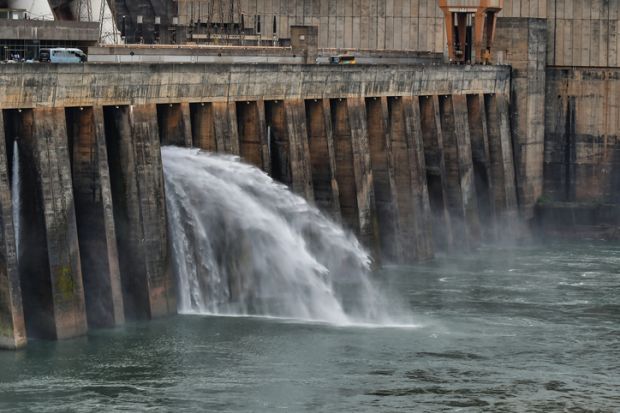Ukraine’s research capacity has fallen by a fifth since Russia invaded the country in February 2022, a new study estimates, with the time the average scientist spends on research per week dropping from 13 hours to about 10 hours.
Led by Gaétan de Rassenfosse, associate professor in science and technology policy at École Polytechnique Fédérale de Lausanne (EPFL), Switzerland, researchers surveyed more than 2,500 scientists between September and December 2022, all of whom were employed by Ukrainian research institutions at the time of the invasion.
“The challenge was to access these guys in the midst of the war,” Dr de Rassenfosse told Times Higher Education. “We tried to reach them through all of the possible contact points we could – email, referrals from their heads of department, Telegram, Facebook, WhatsApp and social media more broadly.”
Of the scientists surveyed, about 17 per cent had left academia or research altogether, with those who left the country after the outbreak of war about 17 per cent more likely to leave the field than those who remained in Ukraine. Study co-author Tetiana Murovana, originally of the Taras Shevchenko National University of Kyiv and former visiting professor at EFPL, was among those to leave academia, Dr de Rassenfosse said.
The study determined that more than 18 per cent of Ukraine’s scientists left the country after the Russian invasion. Those among the top 10 per cent in terms of productivity were 12 per cent more likely to leave Ukraine, while scientists with the highest degrees were 11 per cent more likely. “Ukraine is bleeding its most valuable scientists,” Dr de Rassenfosse said.
A significant majority (87 per cent) of respondents who fled Ukraine and continued their research at a host institution elsewhere said they believed their stay would “improve their scientific abilities”, with many citing exposure to new ideas, methods, data and tools. But the study also uncovered the precarity of their positions: only 14 per cent of migrant scientists had secured a long-term contract at an academic institution.
“Lots of universities offered emergency funding and emergency positions, but now we’re arriving at the end of many of these contracts, which creates a wave of concern for these migrant scientists,” Dr de Rassenfosse said. “They could find a place to breathe for three months, six months, nine months, a year, but now my understanding is that funding has become very tight.”
The results, published in Humanities & Social Sciences Communications, also indicated a fracturing of the Ukrainian research community, with almost half of respondents saying their interaction with scientists in Ukraine had declined, 32 per cent saying they interacted less with Ukrainian scientists in other countries, and 37 per cent saying they interacted less with Ukrainian scientists in their host country. “The separation of the diaspora of Ukrainian scientists is likely to aggravate as the war lingers, making it more difficult to ‘reconnect’ after the war,” the study authors write.
Dr de Rassenfosse called the scientists who didn’t leave Ukraine “the forgotten majority, in a sense”. Of those who remained, about 40 per cent said they conducted less research than they did before the war, while about 10 per cent had stopped conducting research altogether and about 19 per cent had cut their research time to less than three hours a week.
Many scientists were contending with physical impediments to research: almost 21 per cent said they couldn’t physically access their institution, while about 24 per cent could no longer access “critical input” for their work. Of those who stayed, almost 20 per cent had relocated to safer areas within Ukraine.
Speaking to THE, Dr de Rassenfosse also addressed the “lost generation of PhD students” whose studies were disrupted by the war. “Their PhD thesis may no longer be feasible, maybe their supervisor left the country, maybe some of them went to fight,” he said. “To me this is an important long-term impact of the war: 10 years from now, when we will look at the rate of PhD graduates in Ukraine, we’ll see a big gap during the war. The pipeline is broken.”
To minimise the damage to Ukrainian science, Dr de Rassenfosse said, funding was required to prevent more scientists leaving the field. “For scientists who left the country, we need funding to make sure they stay in science. We want to maintain these Ukrainian scientists in the scientific system in Europe to maximise their chances of return,” he said. “For scientists who stayed in Ukraine, it’s important for European countries to create support programmes, maybe joint grants between Ukrainian and foreign scientists.
“There are other cheaper measures that we can take, for example providing free access to library or computing resources, or providing or extending PhD training classes online to Ukrainian scientists,” he added.
Register to continue
Why register?
- Registration is free and only takes a moment
- Once registered, you can read 3 articles a month
- Sign up for our newsletter
Subscribe
Or subscribe for unlimited access to:
- Unlimited access to news, views, insights & reviews
- Digital editions
- Digital access to THE’s university and college rankings analysis
Already registered or a current subscriber? Login








